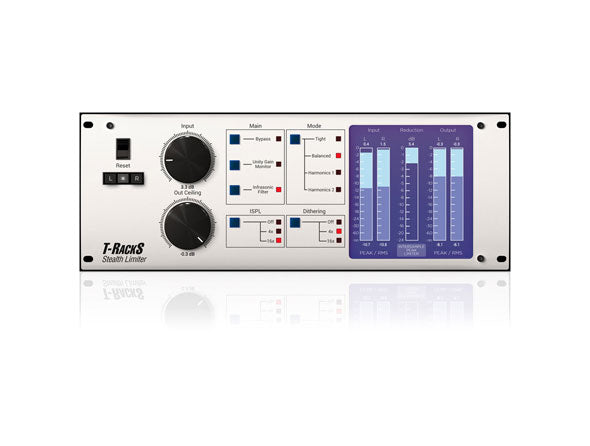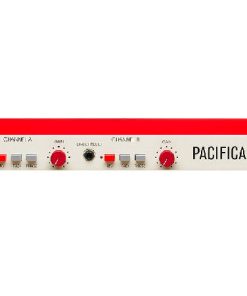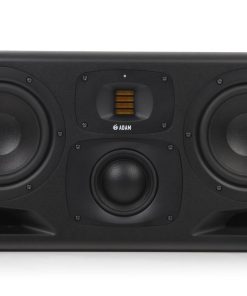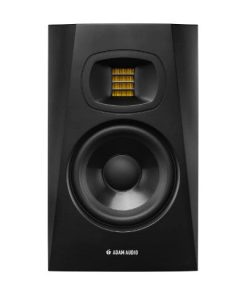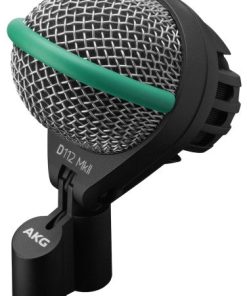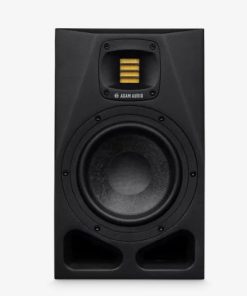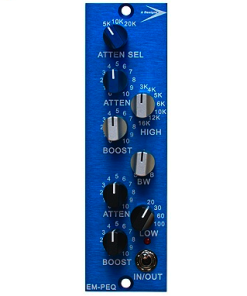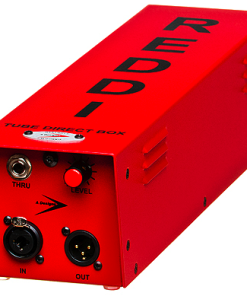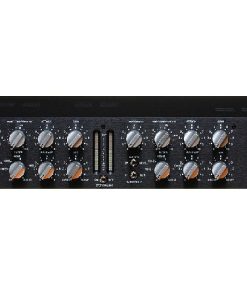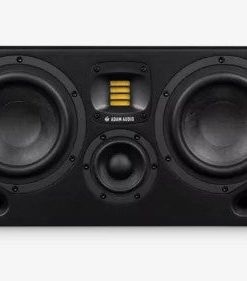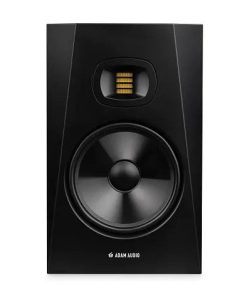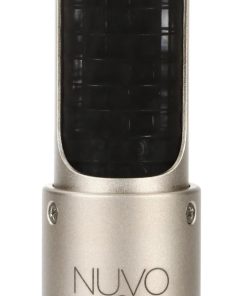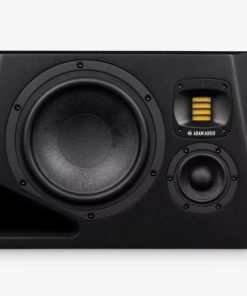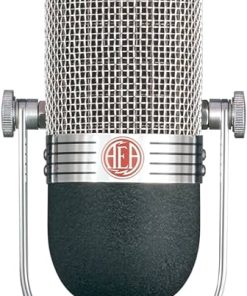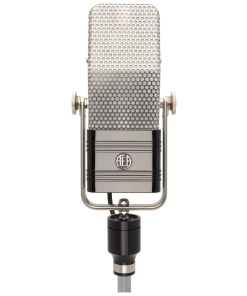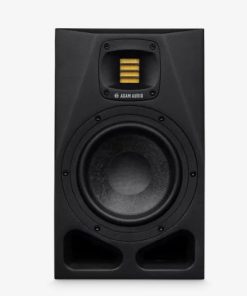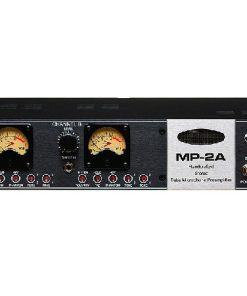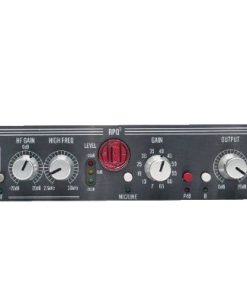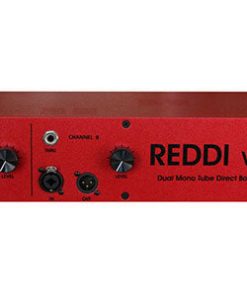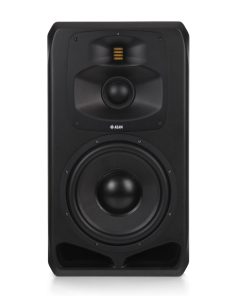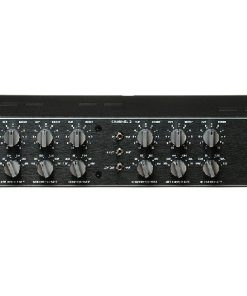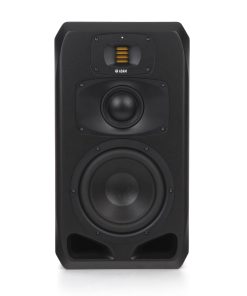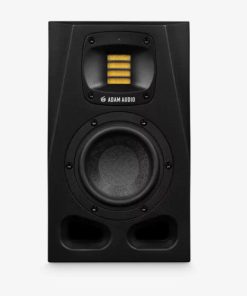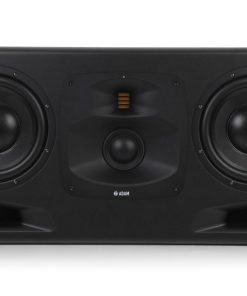IK Multimedia Stealth Limiter Plug-In IK Multimedia
$ 124,99 $ 50,00
The loudest, most transparent mastering limiter available
T-RackS Stealth Limiter is an ultra-transparent mastering peak limiter. It’s a versatile sonic ninja of a mixing and mastering tool that features an advanced inter-sample peak limiting algorithm that lets you turn up the loudness of your mixes while still maintaining a clean a sound that’s full of dynamic range and sonic breathing room. T-RackS Stealth Limiter is your new go-to mastering peak limiter when you want impressive loudness without the damaging side effects of traditional processors.
The loudness wars
The past few decades have seen volume levels rise at an alarming rate. Loudness of mixed and mastered audio material has become a de-facto standard for contemporary music production. This quest for loudness has come at a significant cost — as producers and engineers strive to remain competitive they employ methods of extreme compression and limiting that, though they make a mix louder, also impart an unmistakable mark of residual distortion, sonic flatness and loss of overall emotion. When used heavily, these processors flatten out the music’s dynamics and get rid of much of the music’s magic and emotion when passing between various sections of a song. Our goal was to provide a new kind of processor for the final peak limiting stage of the mastering process that’s able to impart loudness while maintaining more perceived dynamic range than other limiters and compressors.
A stealth weapon
At a basic level, T-RackS Stealth Limiter provides an impressive increase in loudness without the discernable effects of compression. Simply put, it’s the most transparent, clear and loud software mastering peak limiter available. And this is all thanks to its smart level-tracking algorithm. It works under the hood to reduce levels below the volume ceiling moment-by-moment instead of applying traditional look-ahead envelope-based fast attack compression. This algorithm doesn’t sound like a compressor, and that’s because it’s not a compressor! T-RackS Stealth Limiter’s algorithm tracks the level and keeps it under control while simultaneously preserving the perceived sense of dynamics.
A new approach
With traditional mastering processes, it’s normal to push the volume level towards a -0.1dB or even 0.0dB ceiling. Spikes above this ceiling are suppressed via the use of hard limiters and clippers. Yet these methods only ensure a stable digital level, they do not guarantee undistorted playback once the music is translated into an analog signal. This is because the process of playback involves a number of conversion processes that, though the digital waveform may be below 0.0dB, can cause the analog waveform to exceed this threshold and introduce unwanted distortion and fuzz.
T-RackS Stealth Limiter features an inter-sample peak-limiting algorithm that gets around this issue by predicting the converted analog waveform of the digital source. Through this process it’s able to limit the sound in a way that ensures the final converted audio will very rarely exceed the set ceiling. This is useful in the modern era where music is often heard on different devices and via different services that all deliver their music via compressed formats, like MP3 or AAC.
Easy to use
Using T-RackS Stealth Limiter couldn’t be easier. It sports straightforward controls and intuitive features that let you apply its powerful processing to your mixes quickly and effectively. Just use the input knob to set the input level to your desired loudness, and then adjust the output level with its output ceiling knob. Want to take things further? Don’t worry, we’ve got you covered…
Advanced stealth modes
T-RackS Stealth Limiter gives you a suite of advanced controls that are custom tailored for fine-tuning. It sports 4 modes that can each be used for a different mastering purpose:
TIGHT
This is T-RackS Stealth Limiter’s default mode, and it’s most neutral. It respects the source material’s natural sonic dynamics the most. Even when set to the highest limiting setting, the music will never sound “compressed” or “constrained.” With this setting, you can increase loudness while maintaining a neutral effect on sonic timbre and dynamics.
BALANCED
Like its name suggests, this is a more balanced process that can be used when a small amount of dynamic compression is acceptable (or desirable). The difference between this mode and TIGHT is so subtle that the two are only distinguishable at high loudness levels and with extreme limiting.
HARMONICS 1
Though designed to be ultra-transparent, T-RackS Stealth Limiter can also be used in this mode to add a dash of harmonic coloration and sonic enrichment to the processed audio. When engaged it conveys a sense of dimension and pleasant coloration to your mix that will make it sound and feel more analog.
HARMONICS 2
Similar to HARMONICS 1, this mode is also used for adding a bit of sonic character. The difference though is that HARMONICS 2 lets you add some grit and punch when you feel that your music is weak or needs a more thorough boost of analog character.
In addition to these modes, you also get an on-board unity gain monitoring function that lets you listen to your mix’s processed audio without the accompanying increase in volume. This makes it easy to instantly compare processed and unprocessed audio so that you can ensure you avoid the “louder is better” pitfall.
T-RackS Stealth Limiter also comes with an infrasonic filter (a 22Hz, 4th order high pass filter) that can be engaged to cut out unwanted sub-bass frequencies from your mix that could put excessive workload on the limiter.
Combine these advanced features with T-RackS Stealth Limiter’s ability to transparently provide mix loudness, and you have a secret weapon of a mastering tool that you’ll find yourself reaching for again and again..
In a class of its own
Hear the difference for yourself. We’ve created 3 demo tracks: Pop, EDM and Crossover Rock. And then we ran them through the T-RackS Stealth Limiter and also 4 of the most popular and acclaimed “competing” limiters on the market: There’s a $350 competitor, a $300 competitor, a $249 competitor and a $169 competitor. We’ve used the same gain settings on each track, with +8dB for the Pop track, +11.5dB for the EDM track and +6dB for the Crossover Rock track.
In all cases, it should become apparent that T-RackS Stealth Limiter easily outperforms the competition. In fact, you could say that the T-RackS Stealth Limiter really doesn’t have any competition — you’ll notice the dynamics of the tracks are less flattened and more respected. This is clearly noticable with the Pop Song, where strong emotional contrasts occur when passing between verse and chorus passages. On the Crossover Rock track, T-RackS Stealth Limiter maintains the attack of the drums — a nuance that’s lost by other limiters to varying degrees. And, on the EDM track, T-RackS Stealth Limiter’s invisible touch means that the punch and perceived impact is much higher. No matter the situation, T-RackS Stealth Limiter simply sounds cleaner, more open and more detailed than any other limiter currently on the market.
Specs
- Works within the T-RackS CS Standalone application and as plug-in
- High-quality oversampling
- High-precision and high-transparency digital processors
- Accurately analog-modeled vintage classic devices
- Full-latency compensation support
- Supports sampling rates up to 192 kHz
- DSM™ and SCC™ proprietary IK technologies for extremely accurate digital models of analog hardware devices
- Native compatibility with 64-bit applications and operating systems
System Requirements
T-RackS 5 is a 64-bit application and requires a 64 bit CPU and Operating System.
Mac® (64-bits)
Minimal: Intel® Core™ 2 Duo, 4 GB of RAM (8 GB suggested), macOS 10.10 or later.
Supported Plug-in formats (64-bit): Audio Units, VST 2, VST 3, AAX.
Windows® (64-bits)
Minimal: Intel® Core™ 2 Duo or AMD Athlon™ 64 X2, 4 GB of RAM (8 GB suggested), Windows® 7, Windows® 8 or Windows® 10. Requires an ASIO compatible sound card.
Supported Plug-in formats (64-bit): VST 2, VST 3, AAX.
NOTE: EQual processor requires an OpenGL 2 compatible graphics adapter.
Internet connection is required as all of the Custom Shop operations are web based.
Prompt Delivery and Professional Packaging
Our long-standing partnership with UPS FedEx DHL and other global carriers lets us offer a range of shipping services. Our warehouse staff is extremely skilled and will package your items according to our precise and exact specifications. Your goods will undergo an extensive inspection and be safely packaged prior to being sent out. Each day, we ship to thousands of customers in many countries. The fact that we are committed to becoming the biggest online retailer in the World is clear. These warehouses are in Europe in the same way as they are in USA.
Note: Orders that include more than one item are assigned a processing period depending on the item.
Before shipping, we will inspect thoroughly the items you have ordered. Most orders are shipped within 48 hours. Expected delivery time is between 3-7 days.
Returns
Stock is dynamic. It's not entirely managed by us since we are involved with multiple entities, including the factory and the storage. The actual stock can change at any moment. It is possible that your order may be out of stock once the order has been placed.
Our policy lasts for 30 days. We cannot exchange or refund your order if it has been 30 days from the date of purchase.
For your item to be returned it must be in its original packaging, unopened and in the condition you received it. The item must be in its original packaging.
Related products
Recording Equipments
Monitor
Monitor Systems
Monitor
Recording Equipments
Recording Equipments
Accessories
Recording Equipments
Subwoofer
Accessories
Microphones
Microphones
Microphones
Recording Equipments
Microphones
Microphones
Monitor
500 Series
Recording Equipments
Mic Preamp
Monitor Systems
Monitor Systems
Accessories
Equalizers
Monitor Systems
Headphones
Monitor Systems
